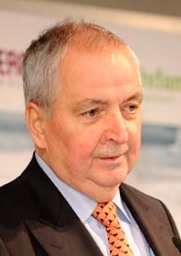United Nations Environment Programme
The United Nations Environment Programme (UNEP) is an agency of the United Nations that coordinates the organization's environmental activities and assists developing countries in implementing environmentally sound policies and practices. UNEP was founded as a result of the United Nations Conference on the Human Environment in June 1972 and is headquartered in Nairobi, Kenya.
History[edit | edit source]
The establishment of UNEP was a significant outcome of the 1972 United Nations Conference on the Human Environment, held in Stockholm, Sweden. The conference was the first major international gathering to discuss global environmental issues, and it led to the creation of UNEP to act as a global advocate for the environment.
Maurice Strong, a Canadian diplomat and environmentalist, was appointed as the first Executive Director of UNEP. Under his leadership, UNEP began to address a wide range of environmental issues, including the protection of the ozone layer, the management of marine pollution, and the promotion of sustainable development.
Mandate and Functions[edit | edit source]
UNEP's mandate is to provide leadership and encourage partnership in caring for the environment by inspiring, informing, and enabling nations and peoples to improve their quality of life without compromising that of future generations. UNEP's work encompasses:
- Assessing global, regional, and national environmental conditions and trends.
- Developing international and national environmental instruments.
- Strengthening institutions for the wise management of the environment.
- Facilitating the transfer of knowledge and technology for sustainable development.
Key Initiatives[edit | edit source]
UNEP has been instrumental in the development of international environmental conventions, promoting environmental science and information, and fostering partnerships with other UN agencies, international organizations, national governments, non-governmental organizations, and the private sector.
Ozone Layer Protection[edit | edit source]
UNEP played a crucial role in the development of the Montreal Protocol, an international treaty designed to protect the ozone layer by phasing out the production of numerous substances responsible for ozone depletion.
Climate Change[edit | edit source]
UNEP is actively involved in addressing climate change through initiatives such as the UN-REDD Programme and the Green Climate Fund. It also supports the Intergovernmental Panel on Climate Change (IPCC) in assessing the science related to climate change.
Leadership[edit | edit source]
Since its inception, UNEP has been led by several notable figures:
- Maurice Strong (1972–1975): The first Executive Director, who laid the foundation for UNEP's global environmental agenda.
- Mostafa Tolba (1976–1992): An Egyptian scientist who led UNEP during the development of the Montreal Protocol.
- Elizabeth Dowdeswell (1993–1998): A Canadian diplomat who focused on sustainable development and environmental governance.
- Klaus Töpfer (1998–2006): A German politician who emphasized the importance of integrating environmental considerations into economic policies.
Related Pages[edit | edit source]
Search WikiMD
Ad.Tired of being Overweight? Try W8MD's physician weight loss program.
Semaglutide (Ozempic / Wegovy and Tirzepatide (Mounjaro / Zepbound) available.
Advertise on WikiMD
|
WikiMD's Wellness Encyclopedia |
| Let Food Be Thy Medicine Medicine Thy Food - Hippocrates |
Translate this page: - East Asian
中文,
日本,
한국어,
South Asian
हिन्दी,
தமிழ்,
తెలుగు,
Urdu,
ಕನ್ನಡ,
Southeast Asian
Indonesian,
Vietnamese,
Thai,
မြန်မာဘာသာ,
বাংলা
European
español,
Deutsch,
français,
Greek,
português do Brasil,
polski,
română,
русский,
Nederlands,
norsk,
svenska,
suomi,
Italian
Middle Eastern & African
عربى,
Turkish,
Persian,
Hebrew,
Afrikaans,
isiZulu,
Kiswahili,
Other
Bulgarian,
Hungarian,
Czech,
Swedish,
മലയാളം,
मराठी,
ਪੰਜਾਬੀ,
ગુજરાતી,
Portuguese,
Ukrainian
Medical Disclaimer: WikiMD is not a substitute for professional medical advice. The information on WikiMD is provided as an information resource only, may be incorrect, outdated or misleading, and is not to be used or relied on for any diagnostic or treatment purposes. Please consult your health care provider before making any healthcare decisions or for guidance about a specific medical condition. WikiMD expressly disclaims responsibility, and shall have no liability, for any damages, loss, injury, or liability whatsoever suffered as a result of your reliance on the information contained in this site. By visiting this site you agree to the foregoing terms and conditions, which may from time to time be changed or supplemented by WikiMD. If you do not agree to the foregoing terms and conditions, you should not enter or use this site. See full disclaimer.
Credits:Most images are courtesy of Wikimedia commons, and templates, categories Wikipedia, licensed under CC BY SA or similar.
Contributors: Prab R. Tumpati, MD






